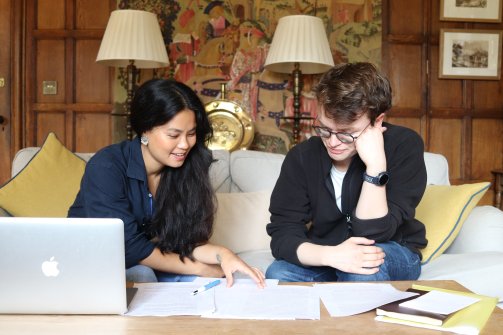The politics of time with Carolyn Smith

A new paper, co-first-authored by Wolfson Junior Research Fellow (JRF), Georg Krainer, could have important implications for how we develop therapies for cancer and other diseases, and could even provide new perspectives on the origins of life.

Published in Nature Communications, the paper analyses the behaviour of liquid-like compartments within cells called biomolecular condensates. The research demonstrates, for the first time, that condensates can re-enter what’s known as a phase-separated regime in response to variations in salt concentration – significantly advancing our understanding of protein phase separation.
The paper has important implications for what we know about the origin of human life, and it supports the perspective that life could have begun from liquid-like macromolecular assemblies and not from membrane-enclosed protocells.
Georg, who is a Research Fellow in the laboratory of Tuomas Knowles at the Department of Chemistry, says: “It means that high salt concentrations, as present in ocean waters, and high saline water bodies, can induce phase separation of proteins and trigger the formation or assembly of membrane-less protocells by phase separation of early biomolecules. Such entities could be at the origin of life.”
The research also demonstrated that, while cells can form and dissolve condensates by changing their environment, sometimes they can transition into what’s called ‘aberrant’ condensates: “Aberrant condensates are pathological condensates,” says Georg. “They are related to neurodegenerative diseases and cancer. Our work has implications for the treatment of these kinds of diseases, because knowledge about a re-entrant transition can aid the design of new drugs.”
The work is a collaboration between the Knowles Lab (University of Cambridge), the Collepardo Lab (University of Cambridge), the Alberti Lab (TU Dresden), the Hyman Lab (Max Planck Institute of Molecular Cell Biology and Genetics), and the St George-Hyslop Lab (University of Cambridge and University of Toronto).
“It represents a true collaboration between experimentalists and computational scientists, and a true global effort in understanding this phenomenon,” says Georg. “It brings together expertise from groups that have pioneered the field of biomolecular condensation with groups that are developing new tools and physical methods to study protein phase separation.”
Georg joined Wolfson as a Junior Research Fellow in Biological Chemistry & Biophysics in April 2020. “Wolfson is a thriving intellectual hub” he says, “bringing together researcher, scholar and students from around the world and from various scientific disciplines. I have hugely enjoyed these interactions, and hope that these can be intensified in post-pandemic times.”
As this new research proves, Georg has kept busy in lockdown, despite its impacts on his work, and he cites Isaac Newton as an inspiration:
“The pandemic has turned everyone's life upside down, and certainly had an impact on my work,” he says. “Our laboratory operations were completely shut down. However, while in home office, I had time to finish writing publications, generate new ideas, and develop projects further. I like to take the example of Isaac Newton: At the time when the plague raged in Cambridge 500 year ago, and the University was closed, he laid the foundation for two of his most important works, while in home office. All I can say is: Carpe Diem – seize the day! We can all only make the best out of it.”
It’s an outlook that will no doubt yield fruit: “Being able to do excellent research is my absolute top priority, and I look forward to many more years of exciting research here in Cambridge. My professional goal is certainly to build up my own research team and secure an independent position at a leading University. The research conditions here in Cambridge are ideal and I can well imagine staying here for longer and take these next steps.”
You can read more detail about the research, as well as interviews with fellow co-first-authors, Timothy Welsh and Jerelle Joseph, on the Gates Cambridge website and the Chemistry Department website.
The full article, ‘Reentrant liquid condensate phase of proteins is stabilized by hydrophobic and non-ionic interactions’, is available online at Nature Communications.







